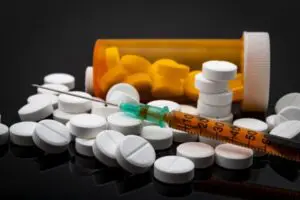The Dangers of At Home Drug Detox and at Home Drug Detox Products

Detoxing, or the process of withdrawing from a substance, is the first and one of the more important steps of addiction recovery. Detox is arguably the most important part of recovery in that, without detoxing, you can never go on to seek out or receive treatment. At the same time, less than 10% of Americans with a substance abuse disorder ever go on to seek out treatment, which means they never seek out professional detox.
Instead, many people choose to detox at home, either going cold turkey or purchasing over-the-counter drug detox products intended to alleviate symptoms. Depending on what the individual is detoxing from, this process of DIY detox can range from simply less effective to extremely dangerous. In addition, without the follow-up of clinical and therapeutic care, the underlying problems behind addiction often remain, leaving the individual to simply relapse again and again.
Understanding the dangers of detoxing at home will help you to make the best choice for yourself or for a loved one.
You May Not Be Able to Go Through with Detox on Your Own
While the idea of detoxing at home is an attractive one, in that you can detox at home, relatively unobtrusively, and then go on with your life, it is one that rarely works. In fact, one of the primary symptoms of a substance use disorder is that you likely have difficulty stopping or quitting use. When you do, you experience strong cravings, which can be extremely difficult to fight on your own. Individuals attempting drug detox on their own often make it through several days of withdrawal symptoms, only to relapse as soon as the worst of the physical symptoms are gone.
If you find that you are able to put a substance down easily and stop using it, you likely aren’t addicted. If you experience withdrawal symptoms but no intense psychological side-effects such as anxiety, depression, numbness, and cravings when quitting, you are likely chemically dependent but not likely addicted.
Withdrawal Can Have Severe Side-Effects

Most drugs cause some form of potentially dangerous side-effects, which, in a healthy individual are often discomfiting. In a long-term drug user, whose health is often considerably lower, they can be extremely dangerous. For example, cold and flu symptoms including vomiting and diarrhea can cause death by choking or dehydration if not monitored.
Some drugs are also more difficult to detox from than others. Cocaine and marijuana tend to have relatively safe withdrawal profiles and may be safer to attempt at home. Opioid detox is very uncomfortable and dangerous and rarely works out well on an at-home basis. Others, including alcohol and benzodiazepines can be lethal without medical attention. Alcohol interacts with the GABA receptors in the brain, which can cause seizures, Grand Mal seizures, and even death. More than 5% of alcohol addicts who attempt to detox on their own develop delirium tremens, a more severe complication of alcohol detox.
Benzodiazepines interact with similar areas of the brain and should never be quit cold turkey. Here, individuals are recommended to slowly taper off the drug to prevent seizures. These drugs, which include Valium, Ativan, Librium, and many others, are commonly prescribed for individuals with mental disorders, PTSD or trauma, or tremor or seizure related issues, which means that detoxing from them can cause rebound issues as well.
The Emotional and Mental Side Effects of Withdrawal are Not Treated at Home
Most drugs cause some form of panic, anxiety, depression, numbness, paranoia, or even psychosis during withdrawal. Individuals who frequently use a substance are typically using them to feel good, which means they are influencing production or absorption of neurotransmitters such as dopamine, serotonin, or GABA in the brain. Over time, the brain stops or reduces its own production of these neurotransmitters. When you go cold turkey, you have no time to adjust, and have periods of emotional blunting where you feel nothing, periods of intense anxiety and paranoia typically relating to low serotonin production or uptake, seizures, and depression. These side-effects can result in trauma, relapse, or, in the worst case, suicide.
In a clinical setting, therapeutic and clinical care is provided side by side, to ensure that patients receive the help they need.
What About Drug Detox Products?

Most states allow several drug detox products to be sold over the counter. Many individuals also attempt to self-medicate, often using the same or similar drugs that would be administered in a medically supported detox clinic. These can range from relatively harmless products such as nutritional supplements to extremely dangerous drugs which could hospitalize you.
For example, prescription medication such as benzodiazepines (especially Ativan, Valium, or Klonopin), opioid painkillers (Percocet or Vicodin), or amphetamines such as Adderall can be extremely dangerous. Benzodiazepines are frequently used to reduce stress and relax the muscles, which can help to prevent panic, anxiety, and seizures. Opiate painkillers are used to decrease general pain. However, each can cause side effects including continued addiction and overdose. While they are used in clinical settings, it is in a very controlled setting, where the dose, route of administration, and time of administration are carefully controlled to have maximum impact with minimum negative effect.
Most individuals attempting to detox at home will do so with painkillers, either over-the-counter or prescription, may do so with a range of prescription medication such as muscle relaxers and sleeping medication, and may purchase something intended to soothe the specific effects of detox. In each case, self-medication likely exacerbates rather than helping the problem, and leads to a risk of continued addiction.
Getting Help
If you or a loved one is struggling with a substance use disorder, there is help. Under the Affordable Care Act, substance abuse treatment is your right and it is (in part) covered by insurance. You also have the right to take up to 12 weeks off from work to seek out substance abuse treatment including detox.
A clinical detox setting will ensure that you or your loved one receives the care needed to move through detox safely. With controlled medical support to reduce detox symptoms safely, without inducing addiction to a new substance, mental and emotional support from trained clinicians and therapists, and a range of treatment including group support, everyone gets to move through detox safely, efficiently, and with dignity. This clinical and therapeutic support is also important as you move out of detox and into residential addiction treatment because it works to prevent further trauma and anxiety and set the stage for further recovery.
Getting help is more than just detox. Detox is the first and one of the most important steps, you still need therapy, behavioral training, and counseling. Without stepping back, recognizing the underlying causes of addiction, and treating it, anyone who goes through detox will likely relapse. While detoxing at home is an option for some drugs, it is often not recommended for reasons of safety, and will result in reduced quality of care, as you won’t receive valuable therapeutic and emotional support throughout detox. Good luck with your recovery.
If you or your loved one is suffering from substance abuse please contact Beginnings Treatment Centers today and speak with one of our experienced and professional intake advisors. We can answer any questions you may have.

